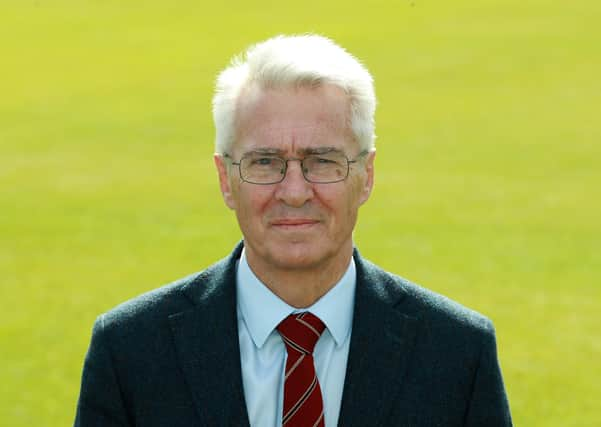Top footballers could see careers shortened by busy calendar, fears leading sports surgeon


Professor Bill Ribbans has been a doctor and orthopaedic surgeon for over 40 years, working with the likes of Greg Rutherford, Paula Radcliffe, Michael Schumacher, Jessica Ennis-Hill, Northamptonshire County Cricket Club, the England rugby union team, English National Ballet and British Board of Control for Boxing. He also worked with footballers, from elite level to his beloved Northampton Town, where he is honorary surgeon.
He shares concerns about the workload on top players as a season condensed by the Covid-19-delayed finish of the last one runs into a major tournament, then a campaign disfigured by a winter World Cup.
Advertisement
Hide AdAdvertisement
Hide Ad“There appears to be more soft-tissue injuries than we would expect this season,” he says, outlining some of the concerns expressed in his book, Knife in the Fast Lane.
“Over the next couple of seasons the really top people are not going to get any break. There’s 13 days between the Champions League final and the Euros (European Championships), and then they go into 2021-22. We already knew the climactic conditions would be difficult at the World Cup (in Qatar) and we’ll be starting 2022-23 early to accommodate it, so by May 2023 there’s going to be absolutely exhausted players. I fear it’s going to shorten the careers of the top players.”
Ribbans supports increasing the substitutes allowed from three to five. The Football League have followed most top European leagues but the Premier League resisted due to opposition from clubs such as Sheffield United.
“I do have sympathy with (Liverpool manager) Jurgen Klopp (a strong advocate) and I can also understand why teams in the lower half of the division have reservations,” he says. “Usually the fate of teams near the bottom of the Premier League is dictated by results against the teams around them so whether that would make a difference, I doubt.”
Advertisement
Hide AdAdvertisement
Hide AdThe focus on increased football injuries is mainly on muscle problems but the workloads can impact other areas too. Leeds United and Sheffield United have lost centre-backs to serious knee injuries, with Robin Koch set to miss three months and the Blades concerned Jack O’Connell may not play again this season.
“Ligament injuries, whether it’s ankle or knee, can be caused by fatigue,” Ribbans points out. “Your balance is compromised.”
He believes “concussion substitutes”, where players can be temporarily replaced to assess head injuries, are “absolutely overdue in football”. They could be trialed in January’s FA Cup ties.
“I’m an orthopaedic surgeon but I’ve spent 25 years admitting head injuries and very, very rarely I’ve had to drill holes into people’s skulls so I’ve seen the bad end of it,” he says. “Players need to be properly assessed away from the crowd and the television cameras and they need a good 10 minutes.
Advertisement
Hide AdAdvertisement
Hide Ad“The HIAs (head injury assessments) in rugby and cricket are quite a weighty document (they run to four dense pages of A4). To go through that very objectively takes time. Rugby’s still got a lot of problems but the players now seem a lot more willing to put their hands up, and look after their mates on the pitch. You often see them beckoning, saying ‘Doc, can you come and look at him, he’s not looking good?’.
“We need that change in psyche and we must have the subs.”
He also thinks immediate action is needed on dementia.
“I got a book last week looking at evidence of links between concussion, heading and dementia,” he says. “It was written in 2000. It may not be evidence that would get into a scientific journal but to say this is a new concern is really not right. Premier League clubs and the PFA (the players’ union the Professional Footballers’ Association) were approached to fund research and really it’s just not got off the ground.
“It will take decades to do proper scientific research but there comes a point when you’ve got enough retired players with dementia to say, ‘I think we’ve got a problem here, what can we do to try and ameliorate it?’.
“I absolutely love seeing a headed goal but I’m delighted children are being looked at, they should look at training – does that affect their skills and could it be reduced to within the penalty area?
Advertisement
Hide AdAdvertisement
Hide Ad“I don’t think we can say this was just a problem when Jeff Astle played with heavy leather balls. The speed these light balls are hit with now, clever doctors doing the research think there’s no evidence the risk is less.”
Ribbans adds it is vital football club medical staff do not feel under pressure from managers.
“There ought to be a much better division between the welfare aspects and the performance side of clubs,” he argues. “There have been calls for complete independence but I think that would be very difficult to do.”
Knife in the Fast Lane, by Bill Ribbans, published by Pitch, supports Prostate Cancer UK.
Advertisement
Hide AdAdvertisement
Hide AdSupport The Yorkshire Post and become a subscriber today. Your subscription will help us to continue to bring quality news to the people of Yorkshire. In return, you’ll see fewer ads on site, get free access to our app and receive exclusive members-only offers. Click HERE to subscribe.
Comment Guidelines
National World encourages reader discussion on our stories. User feedback, insights and back-and-forth exchanges add a rich layer of context to reporting. Please review our Community Guidelines before commenting.